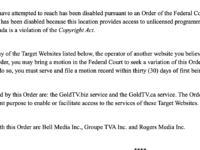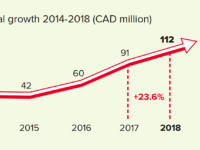It has been nearly 100 days since our colleague and friend Ian Kerr passed away. During that time, scarcely a day goes by where I don’t think about Ian. Whether it is resisting the urge to send him a message seeking his advice or counsel, thinking about how he would have reacted to emerging developments, or passing by the closed door to his office, his presence is still strongly felt by the entire University of Ottawa and technology law communities. I have lost count of the number of times I’ve run into someone who I haven’t seen in awhile and their first response is to express their condolences and admiration for Ian. Indeed, seemingly everyone has a story of how Ian touched them or had a positive impact on their lives.
Blog
Canadian Copyright Website Blocking Underway As TekSavvy Appeals Federal Court Ruling
Last week I wrote about a federal court ruling that opened the door to copyright website blocking in Canada without Parliament establishing site blocking rules or the involvement of the CRTC. The decision is flawed from both a policy and legal perspective, substituting the views of one judge over Parliament’s judgment and relying on a foreign copyright case that was rendered under markedly different legal rules than those found in Canada. I concluded by noting that the case should be appealed and just over a week later, TekSavvy, the independent ISP that stood alone in contesting the blocking order, did just that. Even as the appeal was launched, however, the major Canadian ISPs began blocking access to the specific webpages identified in the court order.
Fool’s Gold: Why a Federal Court Judge Was Wrong To Issue a Website Blocking Order Against GoldTV
A Federal Court of Canada judge issued a major website blocking decision late Friday, granting a request from Bell, Rogers, and Groupe TVA to block access to a series of GoldTV streaming websites. The order covers most of the Canada’s large ISPs: Bell, Eastlink, Cogeco, Distributel, Fido, Rogers, Sasktel, TekSavvy, Telus, and Videotron. The case is an important one, representing the first extensive website blocking order in Canada. It is also deeply flawed from both a policy and legal perspective, substituting the views of one judge over Parliament’s judgment and relying on a foreign copyright case that was rendered under markedly different legal rules than those found in Canada.
Federal Court Short-Circuits Voltage Pictures’ Canadian File Sharing Class Action Copyright Lawsuit Strategy
The Federal Court of Canada has strongly rejected an attempt by Voltage Pictures, one of Canada’s most litigious copyright companies, to use a reverse class action lawsuit approach to sue potentially thousands of Canadians. The court ruled that Voltage met none of the requirements for class action certification and in the process confirmed doubts that merely pointing to an IP address is sufficient grounds for a copyright infringement claim. The Voltage strategy was launched in 2016 as it sought certification of the class, a declaration that each member of the class had infringed its copyright, an injunction stopping further infringement, damages, and costs of the legal proceedings (the issues were discussed in this Lawbytes podcast episode with James Plotkin).
CISAC Labels Canada a “Digital Champion” for Digital Music Royalty Growth
The Canadian music industry has engaged in extensive lobbying efforts on copyright invariably pointing to concerns regarding revenues from digital music services. But the International Confederation of Societies of Authors and Composers (CISAC), which brings together 239 collective management organizations in 122 countries and five regions, recently released a global report that told a much different story, calling Canada a digital champion given the share of royalty revenues coming from digital services. CISAC represents over four million creators active in five major repertoires: audiovisual, dramatic, literature, music and visual arts. Its report identifies five digital champions within its top 20 global markets. Canada sits third in terms of both digital share and five year growth.











